anti-Semitic

JEWISH NEW TESTAMENT scholar Amy-Jill Levine claims that all religions are a little bit supersessionist. Christian supersessionism — which understands God’s covenant with Christians to nullify God’s covenant with the people of Israel — has been so mainstream throughout most of Christian history that it has hardly required articulating. It was just the anti-Jewish water in which we swam. Following the Holocaust, however, Christians recognized how much we’d weaponized supersessionism into antisemitism, which provided support for Nazi and white supremacist ideologies and perpetuated anti-Jewish violence. Unfortunately, Levine argues, no exegetical maneuver can fully expunge supersessionism from the New Testament — though many have tried. It’s there. And the authority of God’s word in Christian lives keeps its dangerous power ever-present.
Still, Paul’s letter to the church in Rome (which we read this month) contains Paul’s own grappling with these questions. Chapters 9 to 11 — wherein Paul corrects some of the Gentile converts who think God has now rejected the covenant with Israel — comprise the hook on which most contemporary attempts to dismantle supersessionism hang their hat. So, we’ll pay special attention to these.
This isn’t going to be an easy fix — particularly for Christians (like me!) who want to hold fast to the gospel, atone for complicity with antisemitism, and stand in solidarity with Palestinians under occupation. Still, I trust God’s promises: I believe both that God’s covenant with Israel endures and that Jesus is the Messiah. So, this month, we are going to sit with the discomfort of failing while attempting the impossible. Because, in trying, we might find a new way through.

One of the two suspects in a shooting in Jersey City, N.J., on Tuesday had previously posted anti-Semitic messages online and was linked to the Black Hebrew Israelite movement.
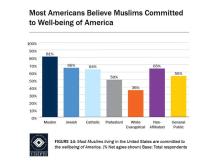
“The vast number of Muslims say being an American is important to how they think of themselves,” said Dalia Mogahed, director of research at the ISPU. “They also say that being a Muslim is important to how they think of themselves. When you look at those identity factors, they’re actually mutually reinforcing — meaning, if you have a higher Muslim identity, you are actually more likely to have a stronger American identity. They’re not in competition.”
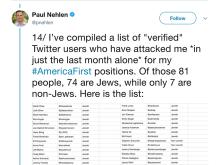
“I see you have me on this list,” New York magazine and HuffPost writer Yashar Ali tweeted. “I’m not Jewish…I’m a practicing Roman Catholic. But I’m in some pretty good company on this list…so feel free to say I’m Jewish.”

Facebook initially responded to the ProPublica report by removing the topics in question from its ad system. But other news reports, including from Slate, then discovered that hateful topics were more widespread in the ad system's targeting capabilities.
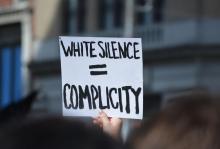
"Our faith is rooted in the incarnation, life, death, and resurrection of Jesus Christ, and his teachings claim authority in life and in death.
We reject as false doctrine any other claim on our lives—whether contrived of state or reason—that violates Jesus’ ethic of the equal and inestimable dignity of all people, each created in the very image of God and as such equally created with the divine call and capacity to sustain, protect, and serve the world."
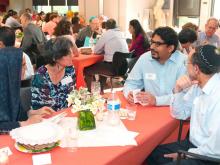
At a time of growing assaults and intimidation of Muslim Americans, the Islamic Networks Group has partnered with 70 interfaith organizations to launch a “Know Your Neighbor” campaign. The effort is intended to encourage individuals and groups to encounter people of faith different from their own.

Signer issued a statement on May 13, criticizing the torch-carrying marchers as either “profoundly ignorant” or aiming to instill fear.
“I smell Jew,” posted an anonymous Twitter user with the handle “Great Patriot Trump.” “If so, you are going back to Israel. But you will not stay in power here. Not for long.”

Anti-Semitic incidents, from bomb threats and cemetery desecration to assaults and bullying, have surged in the United States since the election of President Donald Trump, and a "heightened political atmosphere" played a role in the rise, the Anti-Defamation League said on April 24.

For the first time, a majority of Americans has voiced concern about violence against Jews, polling by the Anti-Defamation League shows.
While 52 percent of Americans surveyed said they are disturbed about such violence, an even higher percentage — 76 percent — said they are concerned about violence against Muslims.
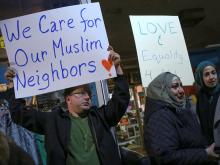
The American Civil Liberties Union collected more than $11 million and 150,000 new members. The Southern Poverty Law Center’s Twitter account gained 9,000 followers. And the Anti-Defamation League, which fights anti-Semitism and other bigotries, saw donations increase fiftyfold.
In the days since Donald Trump won the presidency, these spikes, in support for groups that defend religious and other minorities, speak to a fear that the president-elect will trample on their rights — or at least empower those who would.
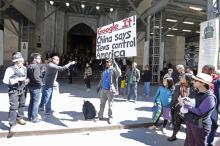
A report released on Oct. 19 by the Anti-Defamation League does not directly indict Trump for this upswing in anti-Semitism. But it explicitly connects some of his supporters to the hate speech.
“The spike in hate we’ve seen online this election season is extremely troubling and unlike anything we have seen in modern politics,” said ADL CEO Jonathan Greenblatt.

This year, Good Friday and the start of Passover occur on the same date: Friday, April 3. The coincidence is no accident.
Jesus’ pilgrimage to Jerusalem to celebrate the eight-day Jewish festival marking the Hebrew slaves’ exodus from Egyptian slavery was a religious requirement for Jews of his day. After his death by Roman crucifixion, Passover became an integral part of the Easter story, and Jesus’ Last Supper was like an early version of what later became the Passover seder meal.
In past years, I anonymously attended Good Friday services in New York and sat alongside Christians as they commemorated the death of Jesus as recounted in the New Testament Gospel of John. I alternated each year between Roman Catholic and Protestant churches because I was interested in how preachers handled John’s 71 references to the Jewish people, a text that’s often called “radioactive” because of its negative teaching about Jews and their alleged culpability in killing Jesus.
I attend the most solemn Christian service of the year knowing it had often been a day of dread and even death for many European Jewish communities.
PEJORATIVE COMMENTS about racial and ethnic minorities, GLBTQI people, and the poor appropriately receive public censure. But say something negative about Pharisees, and the response is likely to be a hearty “amen.”
When anti-Pharisaic comments appear, especially from church pulpits or Christian magazines, few complain. And when correctives are suggested, the responses are usually something like, “Of course not all Pharisees were money-loving, sanctimonious hypocrites.” The comparison to other bigoted comments—“Of course not all Latinos are illegal; of course not all African Americans are lazy”—should tell us how insufficient the excuses are.
Just as we are heirs of centuries of racism, we are heirs of two millennia of negative stereotypes of Pharisees and, by extension, of Jews—for it is substantially from Pharisaic teaching that rabbinic Judaism springs. Whenever sermons and Bible studies proclaim that Jesus’ views concerning social justice are contrary to Jewish views grounded in Pharisaic teaching, they promote bad history and bad theology.
The pastors and priests who make such comments are not anti-Semites. Even Pope Francis, who is certainly no bigot, speaks of Pharisees as “Closed-minded men, men who are so attached to the laws, to the letter of the law, that they were always closing the doorway to hope, love, and salvation.” Rather, these interpreters are unaware of the history of the Pharisees and unaware as well of how these claims about Pharisees often bleed over into anti-Jewish invective.

Christians and Jews are mounting campaigns for and against a path to sainthood for British writer G.K. Chesterton (1874-1936), one of the world’s best-known Catholic converts.
Roman Catholic Bishop Peter Doyle of Northampton, where Chesterton lived and worked, has ordered an examination of Chesterton’s life — the first step in what is likely to be a long and unpredictable process toward canonization.

Anti-Semitic incidents in the U.S. dropped by 13 percent in 2011, according to a report released Nov. 1 by the Anti-Defamation League, which tracks assaults and other attacks on Jews.
There were 1,080 incidents against Jews last year, according to the ADL, the lowest tallied by the non-profit civil rights group in two decades.
“It is encouraging that over the past five or six years we have seen a consistent decline in the number of anti-Semitic incidents across the country and that the numbers are now at a historic low,” said Abraham H. Foxman, ADL's national director.

Respected news outlets unwittingly sent a lie around the world on Sept.12: a Jew backed by 100 Jewish donors made a film insulting Islam's Prophet Muhammad.
Within a day, the lie unraveled. But the damage to the Jewish community had been done, and Jews will continue to suffer for it, say Jewish civil rights leaders.
“This is another blood libel that’s in place,” said Rabbi Abraham Cooper, associate dean of the Simon Wiesenthal Center, referring to a history of conspiracy theories that has fueled anti-Semitism for centuries.